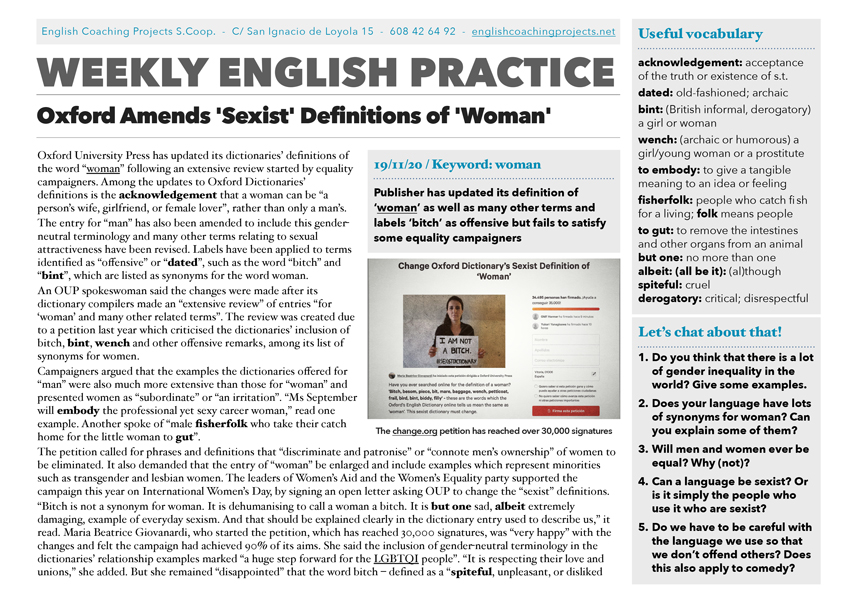Oxford Amends ‘Sexist’ Definitions of ‘Woman’
12/11/20 / Keyword: woman
Publisher has updated its definition of ‘woman’ as well as many other terms and labels ‘bitch’ as offensive but fails to satisfy some equality campaigners.
Click HERE to download the Weekly English Practice as a PDF.
Useful vocabulary
acknowledgement: acceptance of the truth or existence of s.t.
dated: old-fashioned; archaic
bint: (British informal, derogatory) a girl or woman
wench: (archaic or humorous) a girl/young woman or a prostitute
to embody: to give a tangible meaning to an idea or feeling
fisherfolk: people who catch fish for a living; folk means people
to gut: to remove the intestines and other organs from an animal
but one: no more than one
albeit: (all be it): (al)though
spiteful: cruel
derogatory: critical; disrespectful
Listen to the audio and read the text (refresh the page if it’s not visible).
Publisher has updated its definition of ‘woman’ as well as many other terms and labels ‘bitch’ as offensive but fails to satisfy some equality campaigners.
Oxford University Press has updated its dictionaries’ definitions of the word “woman” following an extensive review started by equality campaigners. Among the updates to Oxford Dictionaries’ definitions is the acknowledgement that a woman can be “a person’s wife, girlfriend, or female lover”, rather than only a man’s.
The entry for “man” has also been amended to include this gender-neutral terminology and many other terms relating to sexual attractiveness have been revised. Labels have been applied to terms identified as “offensive” or “dated”, such as the word “bitch” and “bint”, which are listed as synonyms for the word woman.
An OUP spokeswoman said the changes were made after its dictionary compilers made an “extensive review” of entries “for ‘woman’ and many other related terms”. The review was created due to a petition last year which criticised the dictionaries’ inclusion of bitch, bint, wench and other offensive remarks, among its list of synonyms for women.
Campaigners argued that the examples the dictionaries offered for “man” were also much more extensive than those for “woman” and presented women as “subordinate” or “an irritation”. “Ms September will embody the professional yet sexy career woman,” read one example. Another spoke of “male fisherfolk who take their catch home for the little woman to gut”.
The petition called for phrases and definitions that “discriminate and patronise” or “connote men’s ownership” of women to be eliminated. It also demanded that the entry of “woman” be enlarged and include examples which represent minorities such as transgender and lesbian women. The leaders of Women’s Aid and the Women’s Equality party supported the campaign this year on International Women’s Day, by signing an open letter asking OUP to change the “sexist” definitions.
“Bitch is not a synonym for woman. It is dehumanising to call a woman a bitch. It is but one sad, albeit extremely damaging, example of everyday sexism. And that should be explained clearly in the dictionary entry used to describe us,” it read. Maria Beatrice Giovanardi, who started the petition, which has reached 30,000 signatures, was “very happy” with the changes and felt the campaign had achieved 90% of its aims.
She said the inclusion of gender-neutral terminology in the dictionaries’ relationship examples marked “a huge step forward for the LGBTQI people”. “It is respecting their love and unions,” she added. But she remained “disappointed” that the word bitch – defined as a “spiteful, unpleasant, or disliked woman” – continued to be listed as a synonym, albeit now labelled as “offensive”.
She contrasted this to the classification of the word dickhead – defined “as a stupid, irritating, or ridiculous man” – which is considered “vulgar slang” and not included in the list of synonyms for men.
An OUP spokeswoman said their dictionaries “reflect, rather than dictate, how language is used. This is driven solely by evidence of how real people use English in their daily lives. “This independent editorial approach means that our dictionaries provide an accurate representation of language, even where it means recording senses and example uses of words that are offensive or derogatory, and which we wouldn’t necessarily employ ourselves.”
The OUP said its review has developed into an ongoing project to re-examine our treatment of language, with recent work undertaken around race and racial diversity and on the use of “they” as a pronoun for people whose gender identity is neither exclusively male nor female.
Adapted by ECP Coach Kez Kurien from this article:
https://www.theguardian.com/books/2020/nov/07/oxford-university-press-updates-definitions-word-woman
Let’s chat about the definition of woman!
- Do you think that there is a lot of gender inequality in the world? Give some examples.
- Does your language have lots of synonyms for woman? Can you explain some of them?
- Will men and women ever be equal? Why (not)?
- Can a language be sexist? Or is it simply the people who use it who are sexist?
- Do we have to be careful with the language we use so that we don’t offend others? Does this also apply to comedy?

